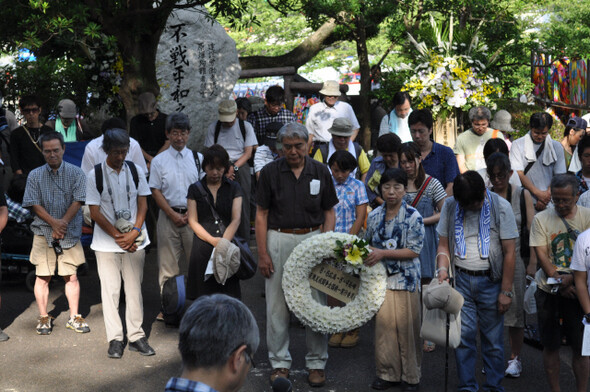hankyoreh
Links to other country sites 다른 나라 사이트 링크
Korean Nagasaki bombing victims remembered on 68th anniversary

By Ahn Gwan-ok, Gwangju correspondent in Nagasaki
A commemorative gathering to bring peace to the souls of Koreans killed in the nuclear attack was held in Nagasaki on Aug. 9, exactly 68 years after the nuclear bomb was dropped on the city.
On Aug. 9, 1945, the US dropped a nuclear bomb on Nagasaki, a city of 240,000 people. 73,884 people were killed in the blast, including an estimated 10,000 Koreans who were living in Nagasaki at the time.
About 200 people, including members of a citizen group for defending the human rights of Korean-Japanese in the Kyushu region of Japan and North Koreans living in Nagasaki, took part in the 68th commemorative gathering for bomb victims. The gathering took place in front of a cenotaph for Korean victims of the nuclear attack, which is located near a park in Heiwa-machi, Nagasaki, which marks ground zero of the blast.
“Japan calls itself the only country in the world to have been attacked by a nuclear bomb, but it ignores the existence of Koreans who suffered the double and triple damage of being pressed into work gangs [during the Japanese colonial occupation of Korea] and then being hurt in the nuclear attack,” said Yasuhiro Takazane, president of the group, during his address.
“Considering that private-sector studies have estimated that 10% of the total victims of the bomb were Koreans, the Japanese government is obligated to provide equal support to the Koreans who were exposed to radiation,” Takazane said.
The group also called for the Japanese government to abolish the upper limit on medical bills for overseas atomic bomb victims, to share the medical records of overseas victims, and to apply the victims’ support act to victims living in North Korea.
“68 years ago, about 10,000 Koreans, or half of the 20,000 who were living in Nagazaki at the time, were sacrificed,” said Kwak Gwi-hun, the honorary chairman of the Association of Korean Atomic Bomb Victims, in a speech for the souls of the departed. “The Japanese militarists who forced them to come to Nagasaki and the companies that were involved in this must repent for their deeds.”
“But the shameful and regrettable thing for Korean atomic bomb victims is that Japan has neither apologized nor set up a proper memorial to the dead but instead continues discriminating against Japanese-Koreans,” said Kwak.
“The recent comments by Prime Minister Shinzo Abe and other Japanese far-right politicians are nearly identical to the mood during the time when militarism was on the rise in Japan just before the outbreak of World War II,” said Lee Tae-jae, chairman of an organization for the second generation of Korean atomic bomb victims. “The citizens of Korea and Japan should join in solidarity to maintain peace and make sure that the tragedy of history is not repeated.”
A somber atmosphere settled over the audience as Lee performed the songs “Arirang” and “Spring in My Hometown” on the daegeum, a large Korean flute made of bamboo, on behalf of the spirits of the nuclear bomb victims, who are left to wander in a foreign land.
“I came to appease the souls of the people who died under such regrettable circumstances,” said Bae Dong-rok (70, from Kitakyushu), who attended the commemorative gathering. “We cannot change the past, but we must pass on to our descendents the task of eradicating war and establishing peace.”
“Every year, I take part in this small but very precious gathering,” Bae said, his eyes red with tears.
Nagasaki mayor Momihisa Taue also sent a memorial message to the gathering, and Japanese organizations opposing war and nuclear weapons along with members of human rights organizations for Palestine and Taiwan took part to call for an international alliance for peace.
After the end of the hour-long ceremony, participants each placed a flower in front of the cenotaph for Korean atomic bomb victims.
Please direct questions or comments to [english@hani.co.kr]

Editorial・opinion
![[Column] A death blow to Korea’s prosecutor politics [Column] A death blow to Korea’s prosecutor politics](https://flexible.img.hani.co.kr/flexible/normal/500/300/imgdb/original/2024/0415/7517131654952438.jpg) [Column] A death blow to Korea’s prosecutor politics
[Column] A death blow to Korea’s prosecutor politics![[Correspondent’s column] The US and the end of Japanese pacifism [Correspondent’s column] The US and the end of Japanese pacifism](https://flexible.img.hani.co.kr/flexible/normal/500/300/imgdb/original/2024/0412/1017129080945463.jpg) [Correspondent’s column] The US and the end of Japanese pacifism
[Correspondent’s column] The US and the end of Japanese pacifism- [Guest essay] How Korea turned its trainee doctors into monsters
- [Guest essay] As someone who helped forge Seoul-Moscow ties, their status today troubles me
- [Editorial] Koreans sent a loud and clear message to Yoon
- [Column] In Korea’s midterm elections, it’s time for accountability
- [Guest essay] At only 26, I’ve seen 4 wars in my home of Gaza
- [Column] Syngman Rhee’s bloody legacy in Jeju
- [Editorial] Yoon addresses nation, but not problems that plague it
- [Column] Can Yoon and Han stomach humble pie?
Most viewed articles
- 1[News analysis] Watershed augmentation of US-Japan alliance to put Korea’s diplomacy to the test
- 2[Guest essay] How Korea turned its trainee doctors into monsters
- 3[Column] A death blow to Korea’s prosecutor politics
- 4[Photo] Cho Kuk and company march on prosecutors’ office for probe into first lady
- 5[Column] A third war mustn’t be allowed
- 6‘National emergency’: Why Korean voters handed 192 seats to opposition parties
- 7Exchange rate, oil prices, inflation: Can Korea overcome an economic triple whammy?
- 8After Iran’s attack, can the US stop Israel from starting a regional war?
- 9[Editorial] New KBS chief is racing to deliver Yoon a pro-administration network
- 10[Editorial] Stagnant youth employment poses serious issues for Korea’s future